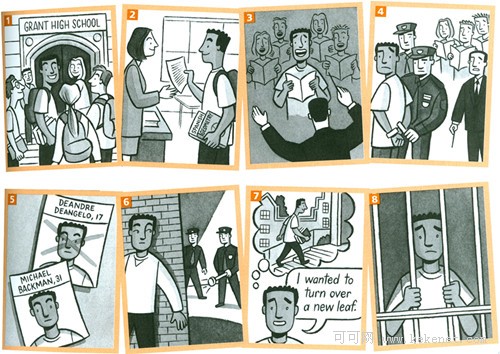可可英語的網(wǎng)友們,大家好,感謝您一如既往的關(guān)注和支持。我們常說“浪子回頭金不換”,不過,這個(gè)浪子是真回頭還是假回頭,還是需要時(shí)間來考驗(yàn)的。不信您聽聽吧。
Mark Hunter seemed like a normal 17-year-old student. When he arrived at Grant High School in Portland in September 1998, he made many friends right away. He was a first-rate student, signing up for a full load of classes, including government, Spanish, and geometry. He always handed in his homework on time. He even sang in the school choir.
But three months later, police interrupted the choir practice and arrested Mark on the spot. It turns out that he was not 17; he was 31! And his real name was not Mark, but Michael Backman. Backman had forged documents to change his identity and become a high school student again. He was trying to hide from police for many different crimes.
Grant High School was the school that Backman attended 13 years earlier. He wanted to turn over a new leaf. "I was trying to return to a time when I was not a criminal, to start again, to get a scholarship and go to college," he told police. Backman is now behind bars for his new crime as well as his old ones.
Mark Hunter是一個(gè)normal正常的,普通的17歲學(xué)生。難得的是,他還是一個(gè)first-rate student。First-rate, 第一流的, 最佳的。First-rate student就是好學(xué)生。再來看一個(gè)例子:The well-known writer is open-minded enough to admit that not all his novels are first-rate. 那位著名作家很虛心,承認(rèn)他的小說并非全是上乘之作。She gave her children a first-rate education. 她給她的孩子一流的教育。
Mark不但學(xué)習(xí)好,而且signing up for a full load of classes。報(bào)名上了全科課程。其中包括了政治學(xué),西班牙語和幾何。Sign up for “報(bào)名參加,登記”。再比如:One great way to meet new people is to sign up for a class that you always wanted to take 認(rèn)識(shí)新朋友的一個(gè)好方法就是報(bào)名參加一門您一直想上的課程。 Many men sign up for the army because they can not get ordinary jobs. 由于找不到工作,許我男人都報(bào)名參了軍。
Mark甚至參加了學(xué)校的合唱團(tuán),不過,三個(gè)月后的一天,他就是on the spot,就在那個(gè)地方被警察逮捕。On the spot思相當(dāng)于at that exact time and place,就在那時(shí)那地。例如:When blood is needed, people volunteer on the spot. 需要血的時(shí)候,人們會(huì)志愿當(dāng)場(chǎng)獻(xiàn)血。Even if your boss refuses to yield, he cannot fire you on the spot. 即使你的老板拒絕讓步,他也不可能當(dāng)場(chǎng)解雇你。
被逮捕后,It turns out that Mark was not 17. it turns out that用法相當(dāng)于what is finally clear is that…意思是“最后謎底揭曉,事實(shí)得到澄清”。來看一個(gè)例子:But it turns out that the habit may destroy some smiles. 但是結(jié)果表明這個(gè)習(xí)慣可能會(huì)讓你再也笑不出來。It turns out也可以作為插入語單獨(dú)使用,表示“如大家所見,像大家看到的那樣”。比如下面這個(gè)句子:Nobody likes being lonely. As it turns out, loneliness can be unhealthy as well. 沒人喜歡寂寞,正如大家所見,孤獨(dú)的生活也對(duì)健康也沒有益處。
故事中揭曉的秘密是,Mark不但不是17歲,而是31歲,并且是個(gè)有很多前科的慣犯。之所以重新回到學(xué)校,一來是為了躲避追查,二來也是希望自己能夠turn over a new leaf,翻開新的一頁。漢語中也常用“翻開新的一頁”這樣的詞語表達(dá)“一個(gè)更好的開始,重新開始,改過自新”。再來看一個(gè)例子。He has been very lazy but he is going to turn over a new leaf and work hard. 他以前一直很懶,但他將改過自新,努力工作。
Mark厭倦了做逃犯的生活,想要重新開始。可是,從前犯下的罪行不可能一筆勾銷,現(xiàn)在他behind bars,在監(jiān)獄中。總要為自己的錯(cuò)誤付出代價(jià)。
好了,回頭看看圖片,按照提示嘗試retell the story吧。我們下期再見。












